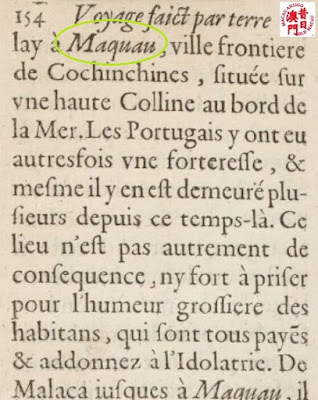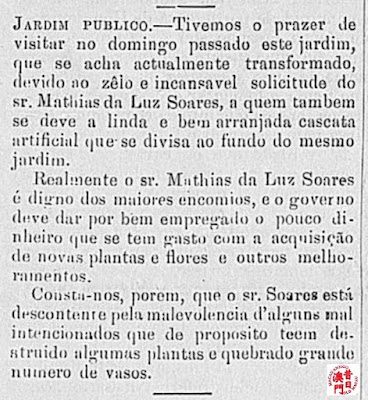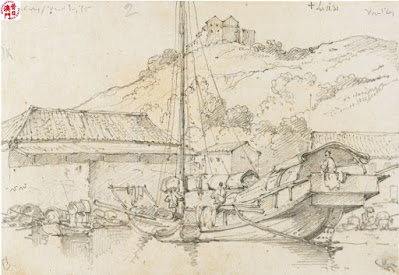Macao, in Chinese Aou mun, the entrance to the bay, is a small granitic peninsula attached to the island of Heang shan by a very narrow isthmus across which the Chinese have built a wall with a guard house and barrier.To the south and east of the peninsula is highland behind which is a stripe of alluvial soil employed in the cultivation of rice.
It is situated in 22 11 N lat and 118 32 lon E of Greenwich. The climate is healthy being freely exposed to the sea air and the place has good water, bread and a well stocked bazaar. On landing you have before you a spacious semicircular bay encompassed with rising hills crowned with forts convents churches and private buildings.
The circuit of the peninsula is said to be about eight English miles its greatest extent three and its greatest breadth nearly a mile. The good harbour which Macao possesses for vessels of small burthen attracted the attention of Europeans at a very early period of their intercourse with China and after having had temporary abodes on it for twenty years the Portuguese in the year 1558 after their expulsion from Ningpo and Chingchew obtained liberty from the local officers to take up their fixed residence at the place and to build more substantial houses.
This liberty was obtained by the seasonable use of bribery with local authorities and not by any Imperial grant in reward for service done by the Portuguese in driving away pirates Macao therefore still belongs in fact to the Chinese Government and in this light it is always regarded by them.
The Portuguese also virtually acknowledge the fact by the annual payment of a ground rent which has varied at different times but is now limited to five hundred taels. This sum is paid at the beginning of every year to the magistrate of Heang shang on the delivery by him of a discharge signed by the Poo ching sze or Treasurer of Canton. The Portuguese are however under the government of their own officers and subject to their own laws though several Chinese authorities have at various times been placed among them.
The Portuguese officers are a Governor and Captain General, an Ouvidor or Chief Justice called also the Minister and the Dezembargador and a Senate which comprises among its members three Vereadores or Inspectors of various branches of the Government, two Judges and a Procurador, who has the general charge of the town and the revenue and is also the organ of communication with the Chinese authorities.
Macao was likewise early erected into a Bishoprick but the see is at present vacant. The Chinese officers are a Keun min foo who is an assistant to the Chief Magistrate of Canton department a Tsoo tang or assistant to the Heang shan district Magistrate two Wei yuens or Custom house officers deputed by the Canton Hoppo and a military officer with a small force under his command residing at Tsee shan or Casa Branca, a military station and village at a short distance beyond the barrier erected by the Chinese in 1597 to prevent the further ingress of foreigners.
The Portuguese and Chinese are both governed by their respective laws and officers while foreigners are subject in some degree to the government of both parties. In civil cases between Chinese and Portuguese the officers of the two nations correspond with each other through the medium of the Procurador, but in several instances of importance the former have shewn a determination to dictate to the latter in what way they are to act.
Before Canton was opened to European commerce generally the Portuguese were for nearly a century almost the only carriers between China and Europe and possessed an exclusive market at Canton for fifty or sixty years as they at that time also enjoyed the carrying trade to Japan.
 |
Baía da Praia Grande na primeira metade do século 19
Guache sobre papel de arroz
Não incluído na obra referida |
Macao was then a rich and flourishing settlement the best and most important pillar the Portuguese had in all the east. Hence when other European nations began to compete with them it became the constant object of mutual contention and strife. Had the offers then made by the Chinese in the years 1717 and 1732 that Macao should be made the emporium for all foreign trade and should receive the duties on all imports been accepted its former affluence and splendour might not only have been still retained but might even have been increased. In both cases however, this splendid offer was declined by the Senate acting under the directions of the Viceroy of Goa.
The gradual decline of Macao dates from this period when other European nations began to compete with the Portuguese in China and in the general Asiatic market. The illiberal principle on which the merchants frequently acted accelerated its ruin which was almost completed in the reign of Kanghe by a prohibition to all China subjects among whom the inhabitants of Macao were included to navigate the southern seas.
At this period (1686) the shipping consisted of but ten vessels which were reduced in 1704 to only two ships that could neither be manned nor fitted out. The number of vessels now belonging to the port is fifteen being ten less than the number to which they are limited by the Chinese.
When Portugal became united in 1581 to the crown of Spain Macao was also induced to submit to the government of Philip I and on the separation of the two kingdoms about sixty years afterwards it was still of so much importance as to be considered a desirable possession. Endeavours were therefore made to retain it for Spain but a large majority of the citizens declared their adherence to the new Portuguese dynasty.
In 1622 the Dutch being anxious to obtain a footing and possession in China endeavoured an invasion of Macao. Thirteen sail of ships were sent against it and eight hundred men effected a landing at Casilha's bay and began marching towards the town but on coming between the two forts of the Monte and the Guia they were routed and driven back by the Portuguese.
To make amends in some measure for their defeat they then took possession of the Piscadore islands in the Formoso Channel belonging to China, on the pretence that the Chinese had assisted the Portuguese against them.
Five years after this, the Dutch made a second attempt on Macao by blockading the Port and making seizure of all vessels that arrived there. But the Portuguese contrived to take and burn the chief ship and the others hearing that a Spanish squadron was advancing from Manila to succour Macao speedily took their departure.
In 1808 an English expedition under the command of Admiral Drury was sent from Bengal to occupy Macao and defend it for the Portuguese against the French. But the Chinese Government immediately stopped the British trade and refused to receive any communication from the Admiral so long as the troops remained in the place. After about three months stay they were therefore quietly withdrawn.
Though the story of Macao being granted to the Portuguese for their services against the pirates be a fabrication yet it is not without the appearance of foundation for since they have occupied the place they have more than once been called upon to assist the Chinese in driving away and subduing the numerous pirates who have at all times infested the coast of Canton.
In 1809 these pirates had become so powerful and daring that they set the Imperial squadron at défiance and frequently plundered European as well as Chinese boats. On this occasion Macao furnished at the desire of the Chinese six vessels manned and furnished for six months and with this assistance accompanied by promises of rewards and honours the chief pirates were brought to surrender to the Government while their immediate assistants were severely punished, some by execution, others by transportation.
Macao is the place set apart by the Chinese for the residence of foreigners when not engaged in business at Canton. The Portuguese Government denies this as a matter of right and has at various times shewn a disposition to refuse individual foreigners permission to reside but the Viceroy of Goa has recently issued an order directing its being granted in all cases so long as the Court of Lisbon shall issue no orders to the contrary.
For a foreign lady landing at Macao the Chinese custom house officers used to exact about one hundred dollars. This in consequence of an old Imperial prohibition against any new females coming to the place issued at the same time with a prohibition against building houses in any new situations or rebuilding old ones without permission. The former prohibition and consequent connivance have now been got over but the latter prohibition still continues in force. New houses are however built but not without much expense on the score of bribery of the local officers. The custom house men used also to levy a charge on every box or package brought on shore from a ship on the Praya Grande and will still do so when they can. But such charges are in opposition to the orders of the Governor of Canton issued two or three years back. The Portuguese Government population is about four thousand five hundred and the Chinese population fifty thousand
in History of the British Colonies: Possessions In Asia, Robert Montgomery Martin, 1834.












































